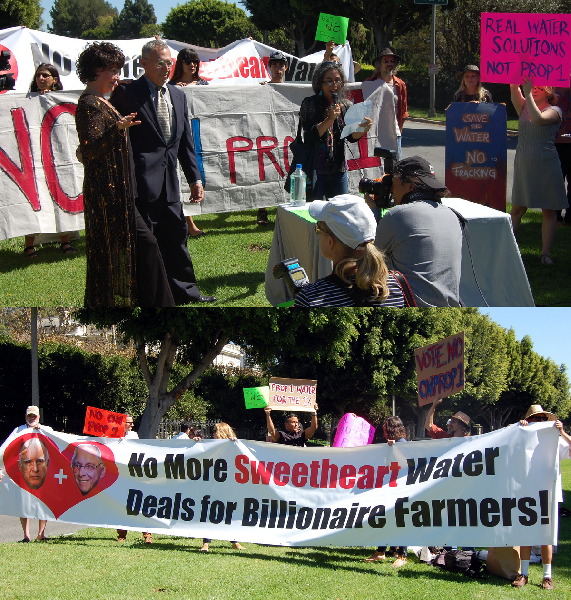Beverly Hills, CA—Despite benefiting handsomely from the privatization of the Kern County Water Bank in 1995, and from a business model that re-sells subsidized water to different branches of the government and developers around the state, Stewart and Lynda Resnick want more, more, more.
California’s November 2014 ballot Proposition 1 would fund up to $7.5 billion in general obligation bonds for water-related infrastructure that would directly benefit billionaires like the Resnicks, who own the largest pistachio and almond producer in the world, Paramount Agribusiness, which is also the largest farming operation in America.
Dozens of voters occupied the median of Sunset Blvd outside the Resnick mansion in Beverly Hills Thursday afternoon to declare “No More Sweetheart Deals for Billionaire Farmers!” Hand-painted signs pleaded for “real water solutions, not Prop 1” and decried the water bond as “water for the 1%,” not for the people of California. #NoOnProp1
At the “No on Prop 1” press conference (
http://www.noonprop1.org/), actors portraying the Resnicks toasted the growth of their own wealth thanks to powerful friends in Sacramento, while a tuxedo-clad waiter held a tray of POM Wonderful juice, Fiji Water, and Wonderful Pistachios (brands owned by the Resnicks’ umbrella company Roll Global). The skit touted record profits in a drought year, revealing the business model of growing water-intensive crops on toxic Central Valley soil for export to foreign markets in China.
Proposition 1 is a blank check for infrastructure projects that directly benefit private water interests. The Kern County Water Bank Authority and the Westlands Water District are eager to increase their capacity to sell water via the proposed Sites Reservoir in Colusa County, which would store water pumped from the Sacramento River. Brenna Norton of Food & Water Watch noted that the bill earmarks $2.7 billion for such dams for special corporate interests. “There’s no water to put in those damns!” she told KABC 7 Eyewitness News. “If there was, all of that water is earmarked for corporations.”
Proponents of Proposition 1, including Governor Jerry Brown and Los Angeles Mayor Eric Garcetti, point out the bill includes funding for cleaning underwater aquifers and stormwater capture. Brenna Norton acknowledges that a small portion of the funds could potentially be used for a project such as cleaning up the San Fernando Valley aquifer, but the funds are incomplete, not guaranteed, and “it’s kind of like asking someone to go buy the whole grocery store when they only need a box of crackers.”
Los Angeles resident Antonieta Villamil described herself as a “taxpayer hungry for common sense” who is “sick and tired of our political representatives not fixing our crumbling L.A. infrastructure.” She reminded the crowd that the City of Los Angeles has 1-2 water main breaks a day. Proposition 1 allocates money towards the wrong priorities, with “inadequate funding for water recycling, not enough funding for groundwater cleanup, and too little funding for local projects that create a real benefit for our local communities.”
Should taxpayers subsidize dams that benefit private agriculture corporations? When interest is added, the total cost of Proposition 1 nearly doubles, to $14.4 billion, all to help water exporters who want to overpump the San Francisco Bay Delta for industrial farming and re-sell taxpayers water that is already owned by the public.
FULL PHOTO GALLERY:
https://www.facebook.com/media/set/?set=a.616589391791253.1073741873.405414422908752 
